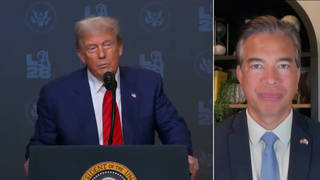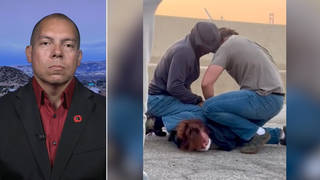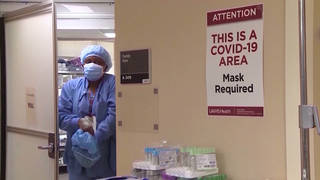
Guests
- Monica Gandhiinfectious disease specialist, professor of medicine at the University of California, San Francisco, and a division head at San Francisco General Hospital.
U.S. health officials have delayed a decision on whether to resume the use of Johnson & Johnson’s COVID-19 vaccine after reports of blood clots in six women who received doses. Dr. Monica Gandhi, an infectious disease physician and professor of medicine at the UCSF/San Francisco General Hospital, says it’s “prudent” to investigate reports of blood clots but notes the issue “is very rare” and unlikely to cause more than a temporary delay. She also says it’s important to raise “vaccine optimism” by continuing to tout the benefits of COVID-19 vaccines. “Eventually we are going to get back to the normalcy of not masking and distancing. We’re just in this twilight period right now because we are not fully vaccinated,” she says.
Transcript
AMY GOODMAN: This is Democracy Now!, democracynow.org, The Quarantine Report. I’m Amy Goodman, with Nermeen Shaikh.
U.S. health officials have delayed a decision on whether to resume the use of Johnson & Johnson’s COVID-19 vaccine, after reports of extremely rare blood clots in six women between the ages of 18 to 48 who received doses. This is out of nearly 7 million Johnson & Johnson vaccines administered in the United States. A Centers for Disease Control panel met Wednesday and may continue the pause for seven to 10 days. They also learned of a seventh woman and man who developed the rare condition.
In this video released by the White House, White House medical adviser Dr. Anthony Fauci explained the reason for the Johnson & Johnson vaccine pause.
DR. ANTHONY FAUCI: A couple of reasons to do that. The first is to investigate this a bit further. And the second is to alert the clinicians out there, when someone comes in with these types of symptoms, to ask them if they have a history of a recent vaccination. … The people who have already gotten the vaccine should not be worried, because, as I mentioned, this is a very rare event, one in more than a million individuals. The J&J vaccine has been shown in clinical trials to be highly efficacious. What we’re talking about now has nothing to do with the efficacy of the vaccine.
AMY GOODMAN: Dr. Fauci is set to testify today before the House select committee that oversees the government’s coronavirus response, along with CDC Director Dr. Rochelle Walensky and Dr. David Kessler, Biden’s chief science officer for the COVID-19 response. This comes as Biden has insisted there are still enough COVID-19 vaccines for everyone in the United States and that the pause of Johnson & Johnson vaccines won’t affect immunization efforts here. This is Biden speaking Tuesday during a meeting with members of the Congressional Black Caucus.
PRESIDENT JOE BIDEN: I told y’all I made sure we have 600 million doses of the mR — not of either Johnson & Johnson and/or AstraZeneca. So, there is enough vaccine — that is basically 100% unquestionable — for every single, solitary American.
AMY GOODMAN: To discuss all of this, and also what it means for vaccine access worldwide, and more, we’re joined by Dr. Monica Gandhi, infectious disease physician, professor of medicine at UCSF — that’s University of California, San Francisco — San Francisco General Hospital.
Doctor, welcome back to Democracy Now! It’s great to have you with us.
DR. MONICA GANDHI: Thank you.
AMY GOODMAN: So, let’s start off with the Johnson & Johnson vaccine. One of the things that Fauci just said, Dr. Fauci said, is to alert clinicians. Now, please explain what exactly happened to these six or seven or eight people. One woman died, and we’re talking about young women. We don’t know if it’s tied to the vaccine. But this whole issue of this rare blood clot in the brain? And I was also very interested that he said we want to alert all clinicians both to report, but also to let them know that what — the standard of care for blood clots is to, you know, give heparin, a blood-thinning medicine, but in this case it has an adverse reaction, and you should not do this.
DR. MONICA GANDHI: Right. So, essentially, like you said, this is very rare — six women out of 6.8 million doses given, and perhaps these additional cases. It was, I think, prudent to just investigate these. We need to see if there was another reason for the clot. We need to see if there was any association with any other medications. And it is true that this particular syndrome, if linked to the vaccine, causes both blood thinning and blood clots. So, it’s thrombocytopenia, which is low platelets and also platelets clumping. So it helps us determine what to do if someone has a headache. These are very rare clots, but they are cerebral venous sinus thrombosis, which means they’re in the brain.
So, you know, this is a temporary pause. This had actually happened with the AstraZeneca vaccine, that there were clots associated with a similar type of vaccine, which is adenovirus with the DNA inside it. And what the EU decided to do was go ahead and proceed with that vaccine, but in older individuals, because the clots weren’t seen in younger individuals. That may end up being what we do here. But right now it’s just time to wait and give a week and examine it.
NERMEEN SHAIKH: Dr. Gandhi, can you say what the implications of this pause are? What are the communities that were receiving the Johnson & Johnson vaccine, especially in areas where it was difficult — it’s been difficult to administer Pfizer and Moderna because of how difficult it is to transport them, the conditions under which they have to be kept, as opposed to Johnson & Johnson?
DR. MONICA GANDHI: Yes. I mean, Johnson & Johnson had advantages, just because the issue was it didn’t need to be kept as cold as the Pfizer and Moderna, and it was one dose, and then you were finished. And there were advantages for hard-to-reach populations, for minority communities. And specifically worldwide, there is an advantage of using an agent that is easy to transport, that’s just in a refrigerator. And this is a setback and concerning.
And I think, you know, AstraZeneca, again, we have a precedent for this with a similar vaccine. And what ended up happening was that it was paused and then resumed, in the EU, at least, in a certain population, and it is still ongoing in India, for example. So, it may not mean — this is a pause; this is not a finality. As President Biden said, we have enough doses of Moderna and Pfizer to continue with this vaccination rate of 3 million doses a day in the United States. But I’m concerned about the impact worldwide.
NERMEEN SHAIKH: Dr. Gandhi, can you explain, because a lot of people, at least initially, were more skeptical of the new vaccines that are now being administered most widely in the U.S. — that is, the mRNA vaccines, Pfizer and Moderna — and their safety and efficacy relative to Johnson & Johnson?
DR. MONICA GANDHI: Yeah. You know, the mRNA vaccines seemed like they were a new technology. And they actually are not, in a sense that they haven’t been used for pathogens anywhere, but they have been used for tumor vaccines. They’ve actually been around and started being developed since 2011, when we had a much, much smaller pandemic from a coronavirus called MERS. And they also were developed quickly because there was a public-private partnership, and they were — money was put to the problem, and this was a terrible pandemic that we needed to get over. So, there were lots of reasons why they were developed quickly, but they’re not actually profoundly new.
And so many doses have been administered now of these mRNA vaccines, and they really have been incredibly safe and profoundly effective — actually even more effective in the real-world setting than we saw in the clinical trials, which is very unusual, because usually the real-world setting is messy and it’s more diverse populations, and you didn’t think that it would be so amazingly effective in the real-world setting. But study after study, including a six-month study of the Pfizer vaccine with data released on April 1st, shows these vaccines are 100% effective across 44,000 people around world against severe disease, and very highly effective, 98%, against symptomatic COVID. So, with all these administrations and how well people are doing and the safety and effectiveness, I think people are becoming very comfortable with the mRNA vaccines.
AMY GOODMAN: So, is there something in the adenovirus — if you could explain vaccines, of Johnson & Johnson and AstraZeneca? Why have they both — this swirl of the possibility of blood clots, though, of course, extremely, extremely rare, why would they be causing this?
DR. MONICA GANDHI: So, they are different types of vaccines. So, the mRNA vaccine is a piece of genetic material, you know, called mRNA, that your body makes into the spike protein of the virus, the thing that sticks out of the virus. And it’s surrounded — the mRNA is surrounded by this lipid nanoparticle, and you inject it in the arm.
The AstraZeneca and Johnson & Johnson are both similar vaccines, and they’re different from the mRNA vaccines. And they actually contain a virus, that’s very benign — it causes colds usually, and it doesn’t even replicate in our systems — called an adenovirus. And then, inside the adenovirus is a coiled-up DNA, and then that DNA goes into your body after you inject it. It’s made by your body into mRNA, and then the same process occurs.
There was a New England Journal study last week that questions whether there’s a mechanism of action, where as — either the DNA or the adenovirus of these two vaccines end up essentially linking and creating an antibody against platelets. Platelets are our clotting factors. So, if you create an antibody against these platelets, they can clump and cause clots, and they can actually also go down in the body and cause bleeding. So, there’s a postulated mechanism — we’ve seen this with heparin, which is a blood thinner, that it can, rarely, cause these antiplatelet antibodies to form. And there’s now a postulated mechanism, and both vaccines have caused these clots. So, it’s prudent to investigate this. Very rare, though.
AMY GOODMAN: So, how will you deal with the people who are vaccine-hesitant or anti-vaxxers altogether? You’ve got the person leading the charge, the Fox News host Tucker Carlson. It is the most-watched cable news show in history, so it’s extremely significant. He seized the opportunity of the Johnson & Johnson pause to suggest the U.S. government is likely downplaying the alleged danger and lying about the efficacy of COVID-19 vaccines.
TUCKER CARLSON: According to the CDC’s new guidance, once you’ve been vaccinated, you still cannot, quote, “attend medium or large gatherings.” The federal health authorities also recommend that you continue to wear your mask when you go outside. How long will this continue? Well according to Yahoo News, experts say it’s, quote, “not entirely clear when it will be considered OK for people who are fully vaccinated to stop wearing masks.” At some point — no one’s asking this, but everyone should be: What is this about? If vaccines work, why are vaccinated people still banned from living normal lives? Honestly, what’s the answer to that? It doesn’t make any sense at all. If the vaccine is effective, there is no reason for people who have received the vaccine to wear masks or avoid physical contact. So maybe it doesn’t work, and they’re simply not telling you that.
AMY GOODMAN: So, Dr. Monica Gandhi, I think we can call you the “masked madam.” You are very serious proponent of masks. Why do you say that it doesn’t indicate failure? And also, let’s be clear that the vaccine-hesitant or anti-vax movement goes across the political spectrum.
DR. MONICA GANDHI: Yes. You know, actually, the CDC has given guidance that indicates when people can stop wearing their masks. And the guidance is vaccinated people around vaccinated people, and vaccinated people around unvaccinated individuals of low risk, like children, who are not at risk for severe disease. The CDC has also given guidance about travel with vaccinated people.
And actually, this is the right thing to do, because it increases vaccine optimism when you tell people that we’re going to eventually get back to normal life, without masks and distancing, once we can get more of our population vaccinated. So, there is a point to be said that eventually we are going to get back to the normalcy of not masking and distancing. We’re just in this twilight period right now because we are not fully vaccinated. And, in fact, there are people desperate to get the vaccine who have not yet had the chance to get the vaccine. So we’re in a transition phase right now.
Actually, a very good thing to look at is Israel and the U.K., which have had vaster — faster vaccination programs than we, and Israel has gradually been easing their restrictions. They’re at 60% first dose given now. And they keep on gradually easing their restrictions and lockdowns, and things are getting more and more normal. This is where we will get to if we can get enough people to take the vaccine. And the U.K. just released major lockdowns on April 12th.
So, I think it is actually important to say that the goal of vaccinations is not to stay in this state of masking, distancing and out-of-normal life, but we do need a temporary state, just a temporary state now, where those of us who are vaccinated are respectful to those of us who are not, unvaccinated. You don’t know what’s going on in a store. You don’t know who’s vaccinated or unvaccinated. And we’re still staying with masks and distancing for now.
NERMEEN SHAIKH: Dr. Gandhi, you mentioned earlier that these mRNA vaccines are even more effective in real-world settings than they were in clinical trials. But we still see in the U.S., despite the fact that the U.S. has administered more doses of vaccine than anywhere else in the world — we still see very high rates of infection in certain areas. So, could you explain this, vaccines versus what people attribute some of these rises in cases to, variants?
DR. MONICA GANDHI: So, yes. So, what happened — and again, I look to Israel and the U.K. as examples of places that have gone faster — is that if you started with high case rates, which — and you haven’t tamped down transmission enough, the vaccine itself can’t bring down cases until you’ve gotten to a certain vaccination rate. So, what happened in Michigan and other states as we were rolling out vaccine is the vaccine wasn’t — rollout wasn’t catching up fast enough to the fact that there was still ongoing case transmission. And unfortunately, there were increased cases, hospitalizations in these areas. This isn’t true across the entire United States. If you started with a lower case rate, like in California, where I live, then the vaccines have been profoundly effective and have kept cases very low. So, I compare this to Israel. Israel actually had a surge in cases after they started rolling out vaccines, because the lockdowns were more permissive than in the U.K., and the U.K. didn’t have that surge.
Now, in terms of variants — this is a very important point. Variants — B.1.1.7, the variant that’s in the U.K. and now also in the Upper Midwest, actually is more transmissible. Luckily, we had data, just the other day, very well-done studies in Lancet Public Health and Lancet Infectious Diseases from England, that they are not more virulent. It’s just that if they move faster and you don’t have enough of your population vaccinated, you can’t keep up until you get enough vaccination in the population, and you maintain your masks and distancing.
However, the most important point about variants is: Will our vaccines not work against variants? And the one thing that I want to clear up for our audience is that — it’s a very clear message, actually. There are two arms of the immune system. It’s very simple. There are antibodies, which are more temporary arms of the immune system, and then there’s a fundamental arm of the immune system that are most effective against viruses, and that’s called cell-mediated immunity, or T cells. All of these vaccines induce T cells. The reason we know that is they actually measured these T cells in the clinical trials. They’re actually very complicated to measure. They take fancy machines. They’re hard to measure. But they took the time to measure T cells in the clinical trials. They all rise appropriately. And indeed, the T cells are effective against all the variants. This is a paper by NIAID, Dr. Fauci’s organization, that he messaged to the White House task force meeting a couple of weeks ago, by Dr. Redd. There’s another paper by Dr. Sette that shows that even if you get the mRNA vaccine and you have a — are exposed to a variant, that your T cells stay active against that variant. So, I think, long term, we will be able to get out of this coronavirus pandemic with these vaccines, if we concentrate on our T cell immunity. So I’m actually not worried about the worst thing that can happen with variants, which is that they evade our immune response.
NERMEEN SHAIKH: Dr. Gandhi, you’ve also advocated a “first dose first” strategy, which was, of course, employed in the U.K., extremely controversially at the time. Could you explain what the advantages of that strategy are? And you mentioned also — so, that’s one. Second, you mentioned earlier that there are people who are desperate for the vaccine who have not been able to get access to it. Could you talk about that, in particular with respect to people in poorer countries, the majority of whom are not expected to get the vaccine anytime this year, and possibly for several years?
DR. MONICA GANDHI: Yes. The idea around “first dose first” is that you’ll give the second dose eventually, but that you delay the time between doses. There are actually great reasons for this. Number one, there was no reason that we had to do three to four weeks with Pfizer and Moderna, respectively. That was just to expediate the trials. Actually, vaccinology has taught us that the longer between doses, the better. It actually gives you more of an immune response. For example, hepatitis B vaccine, we used to give doses sooner, and then we realized we had more immune responses if we give them longer. If you remember, childhood vaccinations, we don’t care if children come in a little late for their vaccines; we care if they come in too early.
And then, the most important reason is, we’ve seen the U.K. strategy, and they have delayed the second dose 'til 12 weeks, and there have been no implications for that, no emergence of variants. And, in fact, they've gone much faster, and they have very low cases in the U.K. and again are opening up more. So, I genuinely believe that the “first dose first” strategy would get more of our population vaccinated. We could bring immunity to more of our population, and then we can give the second dose later.
The reason it’s so important for the global equity question that you just asked is that right now we’re in this strange position where we have a global pandemic and we’re not working hard enough to get global equity to the vaccines. If you give first dose first, you can have more people just fundamentally get more of the first dose, which is up to 80 to 92% effective. And second is that we will never get to complete safety from COVID-19 unless we do whatever is in our power to increase global equity to the vaccines. And there are various ways to do that.
AMY GOODMAN: And speaking of vaccine apartheid, Amnesty just criticized Israel last week for not providing vaccines to Palestinians, saying the move flagrantly violates Israel’s obligations as an occupying power under international law. Very significant, because, as you point out, Israel is often used as the gold standard when it comes to its population in Israel proper, but what’s devastating is what’s happening to the Palestinians in the Occupied Territories.
Dr. Monica Gandhi, I want to thank you so much for being with us, infectious disease physician and professor of medicine at UCSF. I’m Amy Goodman, with Nermeen Shaikh. Stay safe. Wear a mask.













Media Options